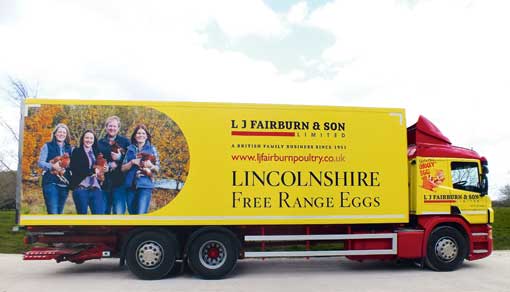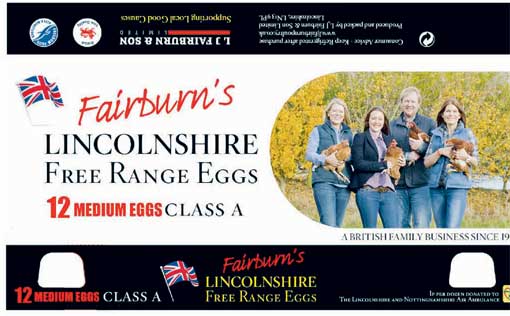L J Fairburn focus on marketing

Earlier this year, the Fairburns egg business broke with packer Noble Foods and decided to go it alone. Caroline Stocks looks at the background to the decision and how marketing is now to the fore
Lincolnshire farming family LJ Fairburn and Son has decided to go back to its roots by dealing directly with retailers in a bid to get a better price for its eggs.
After starting up with £150 and 150 chickens at his farm in Alford in 1951, grandfather James Fairburn initially sold eggs direct to supermarkets before he switched to supply Deans Farms before it came Noble Foods.
Over that time the business grew steadily, branching out into production systems ranging from organic and woodland to free range and enriched cages, and expanding to produce 8m eggs a week from 58 units across 14 local sites.
As well as being Noble’s largest contracted producer, the family also milled 78,000t of feed each year from grain produced from its 1,600 acres of arable land.
But, after a relationship lasting more than 30 years, the Fairburns decided to take their business full-circle and in January they mutually agreed to part ways with Noble Foods so they could resurrect their own relationships with retailers.
The numbers:828,600 intensive chickens106,700 barn67,900 organic145,540 free rangePlus 600,000 chicks being reared at any time
The decision was driven in part by a difficult 12 months for the Fairburn family.
Having invested more than £10m, including a £1m advanced packing centre at Burgh-le-Marsh, 600,000 enriched cages and an £80,000 Ovotrack traceability system, rising input costs were putting pressure in the business.
Concerns over egg prices were compounded when father Stuart was diagnosed with prostate cancer last year.
The illness made him reassess the business and he decided to allow his children Sarah, Caroline, Daniel and Daniel’s wife Sarah Louise to take more control of the company, so they could decide what direction it took in future.
It was a situation which could have put stress on many businesses, but for the Fairburn’s it made them more driven in what they wanted to achieve.
“We are a family business and right back from Jim’s day anything we have made has been invested back into the company to help it grow,” says Sarah Louise, who is the company’s brand director.
“We all have our own children now and we want to build a strong business which we can leave to them if they want to take the business over.”
In control of everything from marketing feed, getting the eggs laid and packaging while they were contracted to Noble Foods, the Fairburns realised the only part of the chain they weren’t in charge of was talking to retailers themselves.
“We had a tough year last year and it made us realise we want to be in charge of our destiny, particularly when it comes to price,” Sarah Louise says.
“We want to sell eggs at a price we deserve and we want to do it for the future of our family, so taking back control to dealing with retailers seemed like a sensible step.”
To test their idea, the company started selling eggs directly to Aldi last November and, after a successful two months in January, parted ways with Noble so they could handle the entire process themselves.

Immediately retailers started contacting them, and since then the Fairburn’s have also signed deals with Iceland and Asda, who they will start supplying with regional free-range eggs in June.
The family have enjoyed adding the new sales and marketing role to their business, despite initial concerns about dealing directly with supermarket buyers.
“We were always told not to talk to retailers – we were best at being farmers, so dealing with retailers made us apprehensive initially,” Sarah Louise says.
“But we got into the meeting with them and realised we didn’t need a salesman acting on our behalf and adding costs to the chain – and we didn’t need to be pushy.
“We tell them what we are about and what we offer,” she adds. “We have a good mix of a great family, youth, progression, high standards and all the accreditation necessary – from British Lion to Freedom Foods and the Organic Food Federations.
“We can prove that we know our business inside-out. Any questions the retailers have, we can answer them right away.”
It’s a back-to-basics approach which Sarah Louise says retailers appreciate, particularly in light of the horsemeat scandal, which has increased consumer and retailer concern over traceability.
“It’s been a refreshing change for the retailer. With all the traceability issues coming to the fore, they like coming back to a family – they like that it’s a family business and that we are involved in every step of the production process.
“If they call the farm, they know they will speak to a member of the family and that we really care about doing the job right; if there’s a fault with a palette of eggs we are upset because we know the time, effort and money that’s gone into producing them.
“Our approach makes a huge difference to our business and we don’t ever want that to change.”
Marketing strategy
To coincide with the change in the business, the Fairburns have embarked on an ambitious marketing strategy to make the most of their strong family heritage and their Lincolnshire roots.
Their range of regional free-range eggs for Asda will support local charity the Nottinghamshire and Lincolnshire Air Ambulance, with a donation of 1p from every dozen sold.
They also have a new website which explains the history of the company, as well as how their eggs are produced.
Social media is becoming an important part of their marketing plans as they run promotions and share egg recipes in a bid to encourage people to eat more eggs.
In future they would like to link up with a chef so they can answer questions and post videos of them cooking with eggs online, to help people realise they can form the basis of tasty and affordable meals.
A new brand of enriched eggs, which has cartoon packaging aimed specifically at children, also aims to boost interest in eating eggs from a young age.
Called Chucky Eggs, a term children in Yorkshire and Lincolnshire use to call eggs, they are currently sold locally in bakeries, butchers and village shops. If it takes off, the brand could be rolled out nationally in future.
“We want to get young people to realise what they can do with eggs, as well as get a better understanding about how they are produced,” Sarah Louise says.
“We have been to Holland to look at a Rondeel system, where children can go and see the whole production process, and we would like to install something like that so we can invite school trips and boost their understanding.
“In future, we definitely have to spend more time not only thinking about how to make eggs more appealing to young people, but how to make farming appealing to them too.”
With additional planning permission granted for further poultry units, and other areas such as processing still left to develop, the family’s drive and determination seems to put them in a strong position for considerable further growth.
“We love what we do and are really passionate about producing eggs. Everything we are doing is to invest for a strong business for generations to come,” says Sarah Louise.
“We want a price that’s fair for our eggs. If everyone takes a fair price in the chain then it works: everyone can make a living and consumers can afford to buy and eat eggs.
“Going it alone is our first step in achieving a fairer price, and if we can get that right then we will secure a business that our children will hopefully want to eventually take over.”
The Fairburn family’s advice on marketing eggs
- Ensure high levels of hygiene and make sure birds are kept in the best possible conditions
- Build your product base and brands so that you have more to offer retailers
- Build your accreditation so you appeal to buyers
- Create a good website which showcases your products, who you are and what you do
- Be open: allow retailers and other farmers to come and look around the farms and ask questions
- Don’t over-promise: make sure you can deliver and do it well
- Be yourself and don’t forget who you are and how you started: keep your roots and build on them
